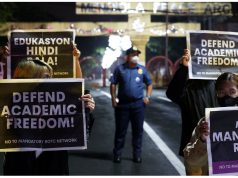MANILA, Philippines — Party-list group Gabriela expressed apprehension that the ruling of the Supreme Court’s Third Division on the “Maria Clara” or the women’s honor doctrine may not be sufficient for rape conviction and could even “open the floodgates to many more rape (cases).”
“They can now go on a rampage with the knowledge that the courts will most likely dismiss the rape case,” the group said.
During a news conference on Wednesday, Gabriela Rep. Emerenciana “Emmi” de Jesus said the ruling had put the burden of proof on the rape victim.
According to the group, the division’s ruling “essentially renders invalid the “women’s honor doctrine” that puts credence on the victim’s testimonies, based on the fact that admitting the rape itself is a very difficult decision for Filipino women in a social setup that puts the shame on raped women and silently condones the attacker.”
“This Supreme Court ruling will surely add a very heavy layer of hardships and even higher financial and social strain especially on poor women victims, while practically giving perpetrators an easy way out,” Gabriela added.
The January 17 ruling penned by Associate Justice Samuel Martires said, “We simply cannot be stuck to the Maria Clara stereotype of a demure and reserved Filipino woman. We should stay away from such mindset and accept the realities of a woman’s dynamic role in society today; she who has over the years transformed into a strong and confidently intelligent and beautiful person, willing to fight for her rights.”
Gabriela secretary-general Joms Salvador noted that the Third Division’s description of the doctrine as non-sequiturcould equally describe the “absurd basis” for assuming that Filipino women’s position in society has improved and are no longer prone to abuse by men.
“There is no reality-based connection to be drawn linking women’s transformed social status or even willingness to fight for their own rights to making women immune to rape and other sexual attacks. The reasoning that the Supreme Court used flies in the face of actual rise of reported and unreported rapes, sexual harassment, bullying, trafficking, and other crimes against women,” Salvador said.
Meanwhile, Bayan Muna party-list Rep. Carlos Zarate lamented that the country’s justice system remains heavily reliant on testimonial evidence rather than on forensic evidence.
“In most cases, it’s the victim who’s just talking,” he said.
Zarate added that in a number of rape cases it would take a while before the victims come out and complain because of the trauma suffered. He also said that minor inconsistencies in their testimonies are expected because it was naturally hard for the victims to recount their experience in the witness stand.
The Third Division acquitted Juvy Amarela and Junard Racho of rape. They were convicted by a Davao court and were sentenced to suffer reclusion peprpetua or up to 40 years imprisonment for the alleged crime committed in 2009. The decision was affirmed by the Court of Appeals.









